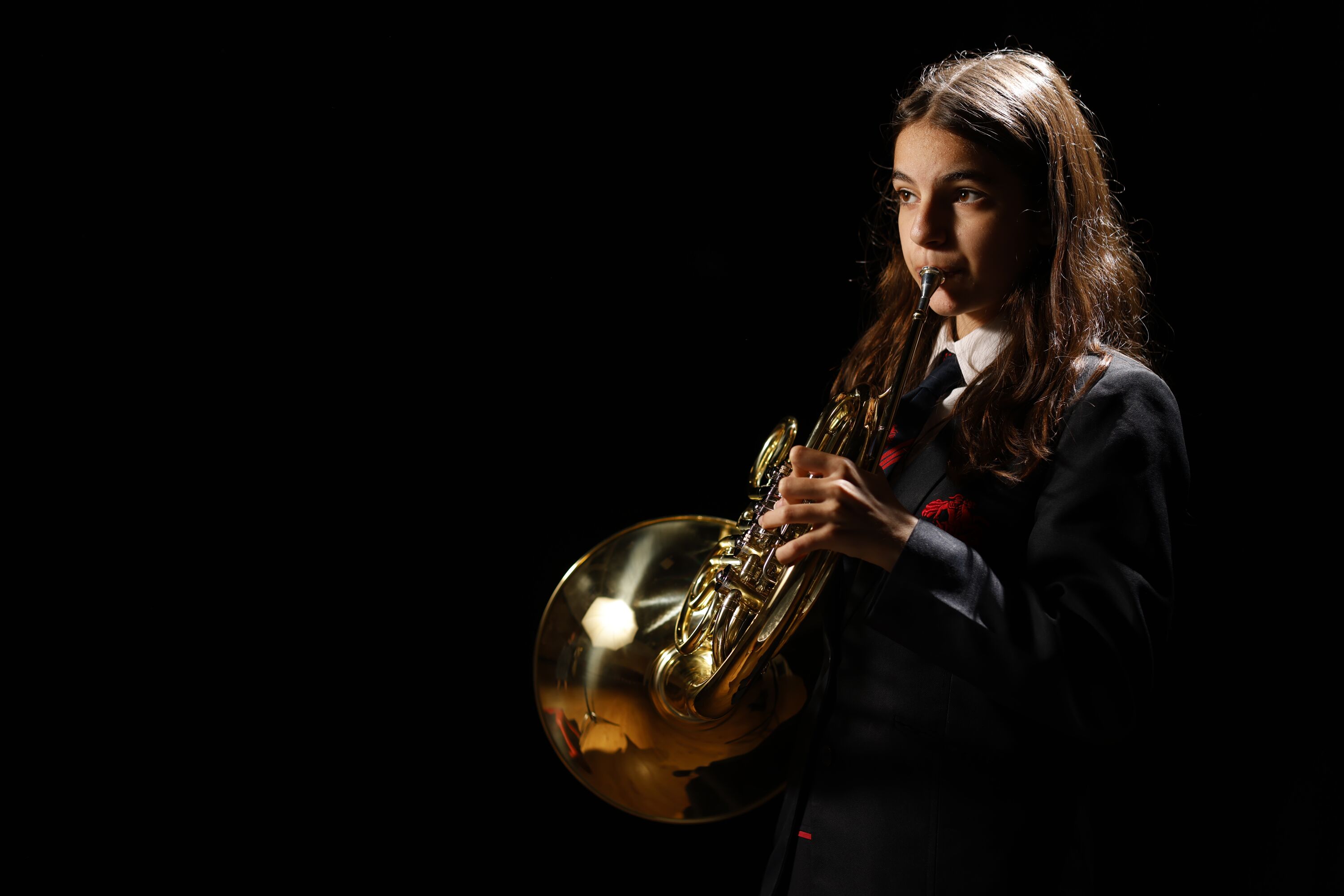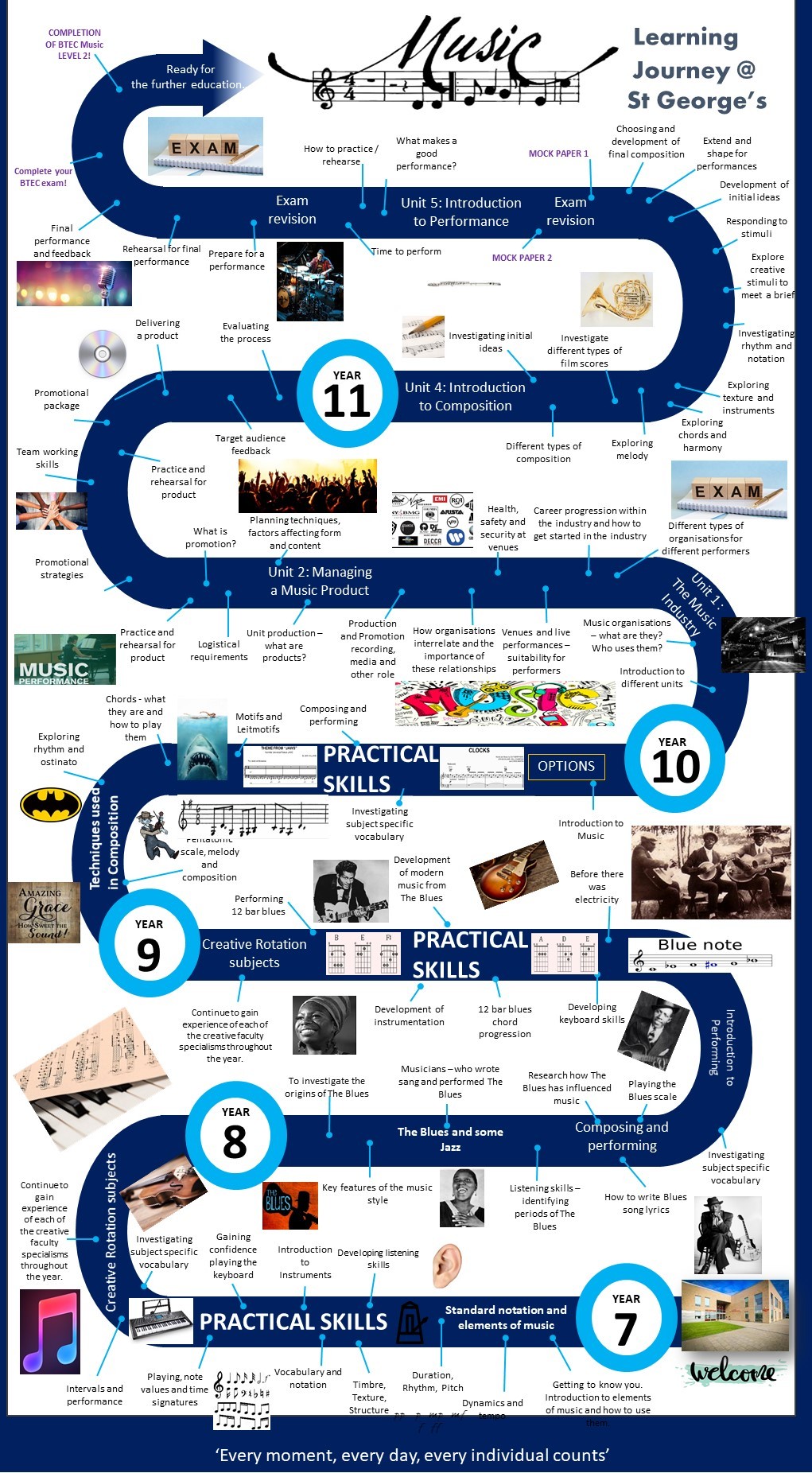Music (GCSE)

Music benefits pupils’ self-esteem, confidence, creativity and communication skills, St George’s pupils are actively engaged in developing the kinds of life skills that will enable them to become confident, expressive and creative citizens. You will learn about the music industry, roles and organisations within the industry; this includes careers such as a sound engineer, technician, backstage crew, journalist, talent scout or working for a union. You will create your own music product or concert; this will be presented to your target audience and real feedback will be offered. In addition to these skills you will learn about composition and will become a composer; you will also learn about performing and all the skills needed in order to create a performance to be proud of.
Instrumental lessons at Secondary.
Monday – guitar / singing / piano
Tuesday – guitar / woodwind / piano
Wednesday – violin
Thursday – singing / piano
Friday – drumming
Subject Vision
St George's provides a progressive curriculum that is adventurous and challenging, leading to resilience, curiosity and independence.
The GCSE Music curriculum aims to inspire and engage students in the study of music, develop their musical skills and interests, and foster a holistic understanding of music.
Adventurous - Students have opportunities to perform music with control, making expressive use of phrasing and dynamics appropriate to the style and mood of the music, as well as performing skills individually and in groups
Resilience –. Through music study, students learn the value of sustained effort to achieve excellence and the concrete rewards of hard work. Being able to learn from mistakes and challenges whilst being supported and encouraged will build self-confidence, self-belief and resilience.
Independence – Students are encouraged and supported to develop their composing skills to organise musical ideas and make use of appropriate resources, recognise links between the integrated activities of performing, composing and appraising and how this informs the development of music
Challenge – Studying Music provides a challenge to students as they need to be able to perform an instrument or sing to a high standard, as well as being able to create original musical pieces exploring a range of styles and genres
Curiosity – The GCSE Course in music provides an opportunity for students to broaden musical experience and interests, develop imagination and foster creativity develop knowledge, understanding and skills needed to communicate effectively as musicians
Community – Through studying music students have the opportunity to enhance their teamwork skills and discipline, as they develop compositions towards their final assessments
Staff
Our Learning Journey

Homework
KS3 Homework
| Week 1 | Week 3 | Week 5 | Time | |
|---|---|---|---|---|
| Year 7 | Title page / subject poster | Key Music vocabulary | Careers research task | 20 mins |
| Year 8 | Title page / subject poster | Key Music vocabulary | Careers research task | 20 mins |
| Year 9 | Title page / subject poster | Key Music vocabulary | Careers research task | 20 mins |
| Year | Homework |
|---|---|
| KS3 | click here |
KS4 Homework
| Task | Time | |
|---|---|---|
| Year 10 | Weekly task relating to Unit being studied in class. | 25-45 mins |
| Year 11 | Weekly task relating to Unit being studied in class. | 25-45 mins |
| Year | |
|---|---|
| Year 11 | To follow |
KS3 Subject Information
Check the Creative Rotation page - Click Here
Level 2 Subject Information - KS4
BTEC Level 1 / Level 2 First Award
The Music Industry is an invaluable, broad and varied industry that employs at least 300,000 in the UK alone. The BTEC First award in Music offers students a broad, stimulating and enjoyable curriculum. It offers opportunities to learn new skills and develop students’ knowledge, understanding and experience of music from performance to composition and learning all the techniques and elements for success on the journey. The curriculum is engaging and designed to develop existing skills, knowledge and understanding that students can bring to the school or improve along the way. It is absorbing, motivating and challenging for all students, whatever their ability and at whatever level music is part of their lives now and leading into the future.
Students studying BTEC Level 1 / Level 2 First Award in Music will receive 3 timetabled lessons per week in years 10 and 11. There are additional opportunities for students to participate in musical activities through the range of extra-curricular activities available and they are expected to attend at least one of these per week. They are all free of charge and support and develop the practical elements of the BTEC course.
Students will study 4 units in total over the 2 year course.
| Term1 | Term 2 | Term 3 | Term 4 | Term 5 | Term 6 | |
|---|---|---|---|---|---|---|
| Year 10 |
BTEC Unit 4 Introducing Music Composition LA A: To explore a creative stimuli to meet a brief. |
BTEC Unit 4 Introducing Music Composition LA B: To develop, extend and shape music for performances. |
BTEC Unit 4 Introducing Music Composition LA C: To present compositions appropriately. |
BTEC Unit 2 Managing a Music Product. LA A: To plan, develop and deliver a music product. |
BTEC Unit 2 Managing a Music Product. LA B: To promote a music product. |
BTEC Unit 2 Managing a Music Product. LA C: To review the management of a music product. |
| Year 11 |
BTEC unit 1 The Music Industry LA A: To understand different types of organisations that make up the music industry. |
BTEC Unit 1 The Music Industry. LA A: To understand different types of organisations that make up the music industry. |
BTEC Unit 1 The Music Industry. LA B: To understand job roles in the music industry. |
BTEC Unit 1 The Music Industry. LA B: To understand job roles in the music industry. |
BTEC Unit 5 Introducing Music Performance. LA A: To develop your music performance skills and review your own practice. |
BTEC Unit 5 Introducing Music Performance. LA B: To use your music performance skills within rehearsal and performance. |
BTEC Music - Course Information
Revision
Job Opportunities / Careers
A GCSE in Music can open doors to various music-related careers, including performing, teaching, production, and more. It can also be a stepping stone to further education in music or other fields, developing valuable skills that are transferable to diverse professions.
Specific Career Paths:
- Performing & Recording: This includes becoming a musician, singer, songwriter, or opera singer.
- Music Production: Roles like record producer, sound engineer, audio engineer, and music mixer are involved in the technical and creative aspects of recording.
- Music Education: Options include becoming a music teacher at various levels, from private lessons to secondary school teaching.
- Music Therapy: This field uses music to help individuals with various challenges.
- Music Management & Promotion: Roles like talent agent, music manager, and music promotions manager are involved in the business side of the industry.
- Broadcasting & Radio: This includes radio producers, DJs, and radio broadcast assistants.
- Music Journalism & Writing: Music journalists and reporters cover the industry, write about music, and may work for publications or online platforms.
- Other Music-Related Roles: This includes concert management, musical instrument maker/repairer, and music supervisors in film and TV.
Useful Websites
Useful Websites for further information on careers and apprenticeships:
https://www.learnhowtobecome.org/arts-humanities-careers/music/
https://www.prospects.ac.uk/careers-advice/what-can-i-do-with-my-degree/music
Music Handout
See HERE


